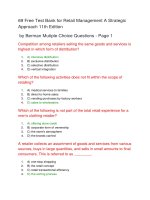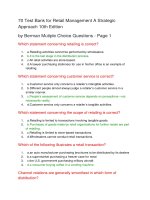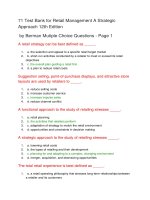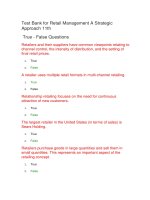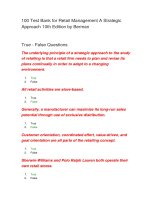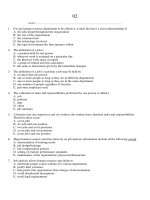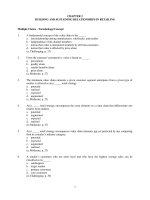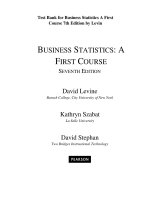100 test bank for retail management a strategic approach 10th edition by berman đề trắc nghiệm marketing
Bạn đang xem bản rút gọn của tài liệu. Xem và tải ngay bản đầy đủ của tài liệu tại đây (110.55 KB, 23 trang )
100 Test Bank for Retail Management A Strategic
Approach 10th Edition by Berman
True - False Questions
The underlying principle of a strategic approach to the study of retailing is
that a retail firm needs to plan and revise its plans continually in order to
adapt to a changing environment.
1.
True
2.
False
All retail activities are store-based.
1.
True
2.
False
Generally, a manufacturer can maximize its long-run sales potential
through use of exclusive distribution.
1.
True
2.
False
Customer orientation, coordinated effort, value-driven, and goal
orientation are all parts of the retailing concept.
1.
True
2.
False
Sherwin-Williams and Polo Ralph Lauren both operate their own retail
stores.
1.
True
2.
False
Those business activities that involve the sale of goods and services to
consumers for personal, family, or household use make up a definition of
retailing.
1.
True
2.
False
Retailing transactions must always involve a retailer.
1.
True
2.
False
Slotting allowances represent a retailer’s channel power.
1.
True
2.
False
Selective distribution has neither the channel cooperation found in
exclusive distribution nor the sales potential of intensive distribution.
1.
True
2.
False
The use of a firm’s total retail strategy to satisfy its target market
represents the coordinated effort phase of the retailing concept.
1.
True
2.
False
A manufacturer can limit price competition in a retail area through use of
intensive distribution.
1.
True
2.
False
The final stage in a channel of distribution is retailing.
1.
True
2.
False
Channel relations tend to be most volatile in exclusive distribution.
1.
True
2.
False
The total retail experience deals with a customer’s involvement with a
retailer from pre-sale discussions to post-sale service.
1.
True
2.
False
Operating costs in supermarkets are higher than those in department
stores.
1.
True
2.
False
Retailers are able to charge slotting allowances due to the high
competition for shelf space among new products.
1.
True
2.
False
Through the sorting process, consumers are provided one-stop shopping
and retailers are provided with impulse purchases through related-item
merchandising.
1.
True
2.
False
The principles of strategic planning in retailing are equally applicable to
small and large retailers.
1.
True
2.
False
Relationship retailing is a short-term approach.
1.
True
2.
False
A change in retail productivity can have a large impact on consumers and
the economy.
1.
True
2.
False
Frequently, retailers and their suppliers have divergent viewpoints that
need to be reconciled.
1.
True
2.
False
While they do not directly involve a store facility, Web transactions, mailorder sales, direct selling, and vending machine sales are components of
retailing.
1.
True
2.
False
The sorting process allows retailers to purchase goods from a variety of
manufacturers and to sell them in small quantities to consumers.
1.
True
2.
False
Channel conflict can be minimized through intensive distribution and/or
horizontal integration.
1.
True
2.
False
An integrated approach to customer service needs to study the total retail
experience.
1.
True
2.
False
Relationship retailing focuses on keeping existing customers, as well as
attracting new ones.
1.
True
2.
False
A manufacturer seeking to maximize its market share should utilize
selective distribution.
1.
True
2.
False
Customer service is a part of the total retail experience.
1.
True
2.
False
An approach to the study of retailing which focuses on a retailer’s need to
revise plans continually in order to adapt to a changing environment is the
retailing concept.
1.
True
2.
False
Only large firms can successfully adjust their retail strategies in response
to consumer preferences.
1.
True
2.
False
Mutiple Choice Questions - Page 1
Which of these is not a characteristic that distinguishes retailing from
other types of business?
1.
a.Store location is more important for retailers than for wholesalers.
2.
b.The average size of a sales transaction for retailers is less than for
manufacturers.
3.
4.
c.Retail sales are more cyclical than organizational sales.
d.While final consumers make many impulse purchases, organizational
consumers are more systematic in their purchasing activity.
According to the Department of Commerce, annual U.S. retail store sales
exceed _____.
1.
a.$200 billion
2.
b.$1 trillion
3.
c.$2 trillion
4.
d.$4 trillion
The retailing concept is comprised of _____.
1.
a.price orientation, social responsibility, and competitive defensibility
2.
b.niche strategy, cost leadership, and market segmentation
3.
c.customer orientation, coordinated effort, value-driven, and goal orientation
4.
d.short-run objectives, long-term strategy, implementable actions, and channel
control
In 2004, the ten largest U.S. retailers earned average after-tax profits
amounting to about _____ percent of sales.
1.
a.1.1
2.
b.2.5
3.
c.3.3
4.
d.5.7
The sorting process refers to _____.
1.
a.physical distribution assortment by perishability
2.
b.a retailer’s pricing goods by quality and size
3.
c.government grading standards for produce
4.
d.a retailer’s collecting an assortment of goods and services from many vendors
While some manufacturers specialize by producing one product,
consumers generally favor retailers with extensive selections from many
manufacturers. These divergent viewpoints can be reconciled through
_____.
1.
a.the sorting process.
2.
b.selective distribution
3.
c.intensive distribution.
4.
d.exclusive distribution
A functional approach to the study of retailing stresses _____.
1.
a.retail planning
2.
b.the activities that retailers perform
3.
c.adaptation of strategy to match the retail environment
4.
d.opportunities and constraints in decision making
An approach to the study of retailing that stresses activities such as
buying, pricing, and personnel practices is a _____ approach.
1.
a.strategic
2.
b.functional
3.
c.institutional
4.
d.retail audit
In relationship retailing, a retailer _____.
1.
a.seeks to maximize a customer’s short-term satisfaction
2.
b.prefers to attract new customers over retaining existing customers
3.
c.seeks to attract larger customers over smaller accounts
4.
d.plans to establish and maintain long-term bonds with its customers
Which one of the following is not a crucial element in Target’s overall
retail strategy?
1.
a.growth-oriented objectives
2.
b.a focus on its discount store niche
3.
c.sale of goods at the lowest competitive price
4.
d.strong customer service for its retail category
A retailer’s selling to consumers via store, catalog, and the Web illustrates
_____.
1.
a.selective distribution
2.
b.impulse purchasing
3.
c.intensive distribution
4.
d.multi-channel retailing
Which of the following distribution functions are generally not provided by
retailers for their manufacturer/wholesaler suppliers?
1.
a.contact with the final customer
2.
b.inventory storage prior to sale
3.
c.pre-paying for merchandise in advance of its being sold to final consumers
4.
d.delivery and installation of goods to final consumers
Suggestion selling, point-of-purchase displays, and attractive store
layouts are used by retailers to _____.
1.
a.reduce selling costs
2.
b.increase customer service
3.
c.increase impulse sales
4.
d.reduce channel conflict
A strategic approach to the study of retailing stresses _____.
1.
a.lowering retail costs
2.
b.the types of retailing and their development
3.
c.planning for and adapting to a complex, changing environment
4.
d.merger, acquisition, and downsizing opportunities
Which of the following illustrates a retail transaction?
1.
a.an auto manufacturer purchasing brochures to be distributed by its dealers
2.
b.a supermarket purchasing a freezer case for meat
3.
c.the U.S. government purchasing military aircraft
4.
d.a consumer buying coffee in a vending machine
Which statement concerning retailing is correct?
1.
a.Retailing activities cannot be performed by wholesalers.
2.
b.It is the last stage in the distribution process.
3.
c.All retail activities are store-based.
4.
d.A lawyer purchasing stationery for use in his/her office is an example of retailing.
The identifiable, but sometimes intangible, activities undertaken by a
retailer in conjunction with the basic goods and services it sells comprise
the retailer’s _____.
1.
a.level of commitment to the retail concept
2.
b.peripheral services
3.
c.customer satisfaction level
4.
d.customer service
All of the elements in a retail offering that encourage or inhibit consumers
during their contact with a given retailer make up the _____.
1.
a.total retail experience
2.
b.retailing concept
3.
c.marketing concept applied to retailing
4.
d.customer service philosophy
Which of the following is not an element in the retailing concept?
1.
a.customer orientation
2.
b.high levels of customer service
3.
c.coordinated effort
4.
d.value-driven
Which of the following illustrates channel conflict between a manufacturer
and its retailer customers?
1.
a.a discounter’s selling a manufacturer’s product below levels at full-service
retailers
2.
b.a cooperative advertising program in which retailers are encouraged to use
selected advertising materials
3.
c.a manufacturer assisting retailers with inventory financing for its products
4.
d.a manufacturer developing a toll-free hot line for customer support
All of the businesses and people involved in the physical movement and
transfer of ownership of goods and services from producer to consumer
constitute _____.
1.
a.a channel of distribution
2.
b.wholesaling
3.
c.retail management
4.
d.the sorting process
The total retail experience is best defined as _____.
1.
2.
a.a retail operating philosophy that stresses long-term relationships between a
retailer and its customers
b.value-generating elements in the retail transaction
3.
c.all the elements in a retail offering that encourage or inhibit consumers during
their contact with a retailer
4.
d.those retail strategies that contribute to total satisfaction among all retail
stakeholders
A manufacturer’s long-term sales potential is most limited in _____.
1.
a.selective distribution
2.
b.cooperative wholesaling
3.
c.intensive distribution
4.
d.exclusive distribution
The first stage in development of a retail strategy should be to determine
the retailer’s _____.
1.
a.most appropriate target market
2.
b.short-run objectives
3.
c.long-run objectives
4.
d.type of business and orientation of the firm
A retail strategy can be best defined as _____.
1.
a.the selection and appeal to a specific retail target market
2.
b.short-run activities conducted by a retailer to meet or exceed its retail objectives
3.
c.the overall plan guiding a retail firm
4.
d.a plan to reduce retail costs
An electronics retailer accomplishes a consumer’s one-stop needs
through _____.
1.
a.the sorting process
2.
b.a deep channel of distribution
3.
c.a wide channel of distribution
4.
d.exclusive distribution
How many million people are employed by traditional retailers in the
United States?
1.
a. 7
2.
b.15
3.
c.25
4.
d.30
Channel relations tend to be most volatile in which form of distribution?
1.
a.exclusive distribution
2.
b.intensive distribution
3.
c.selective distribution
4.
d.vertical integration
A manufacturer seeking to maximize its sales should utilize _____
distribution.
1.
a.dual
2.
b.intensive
3.
c.selective
4.
d.exclusive
On average, what percent of every sales dollar goes to department store
retailers as compensation for the activities they perform?
1.
a.15
2.
b.22
3.
c.30
4.
d.50
A retailer does generally not stock a broad selection of brands in which
form of distribution?
1.
a.exclusive distribution
2.
b.intensive distribution
3.
c.selective distribution
4.
d.operational distribution
Which statement concerning customer service is correct?
1.
a.Customer service only concerns a retailer’s intangible activities.
2.
b.Different people almost always judge a retailer’s customer service in a similar
manner.
3.
c.People’s assessment of customer service depends on perceptions—not
necessarily reality.
4.
d.Customer service only concerns a retailer’s tangible activities.
Which form of distribution balances channel cooperation with an
increased opportunity for product sales?
1.
a.exclusive distribution
2.
b.selective distribution
3.
c.intensive distribution
4.
d.dual distribution
In 2004, the three largest retailing companies (based on annual sales) in
order of size (from the largest firm) were _____.
1.
a.Sears, Kmart, and Federated Department Stores
2.
b.Sears, Wal-Mart, and J.C. Penney
3.
c.Wal-Mart, Sears Roebuck, and Kroger
4.
d.Wal-Mart, Home Depot, and Kroger
Channel relations are generally smoothest in which form of distribution?
1.
a.selective distribution
2.
b.intensive distribution
3.
c.exclusive distribution
4.
d.dual distribution
In exclusive distribution, suppliers _____.
1.
a.enter into agreements with one or a few retailers that designate the latter as the
only companies in specified geographic areas to carry certain brands and/or
product lines
2.
b.sell to as many retailers as possible
3.
c.sell to a moderate number of retailers
4.
d.utilize multiple channels of distribution to reduce channel conflict
Which statement concerning the scope of retailing is correct?
1.
2.
a.Retailing is limited to transactions involving tangible goods.
b.Purchases of goods made by retail organizations for further resale are part of
retailing.
3.
c.Retailing is limited to store-based transactions.
4.
d.Wholesalers cannot conduct retail transactions.
70 Free Test Bank for Retail Management A Strategic
Approach 10th Edition by Berman Mutiple Choice
Questions - Page 2
The arrangement of goods within a supermarket or department store is
systematically studied to maximize _____.
1.
a.manufacturer cooperation
2.
b.impulse sales
3.
c.payments by manufacturers
4.
d.self-service merchandising
A college bookstore that purchases goods from over 200 vendors
demonstrates _____.
1.
a.economies of scale
2.
b.a channel of distribution
3.
c.the sorting process
4.
d.vertical integration
Strategic planning in retailing _____.
1.
2.
a.can be practiced by both small and large retailers
b.requires computer-based marketing research and accounting systems to be
successfully implemented
3.
c.should focus on short-run profits
4.
d.requires a high risk-taking philosophy to succeed
The use of independent channel members in a channel of distribution
allows manufacturers to _____.
1.
a.improve channel communication and control
2.
b.increase the average order size to retailers
3.
4.
c.receive payment based on when goods are shipped to retailers, not when goods
are sold to final consumers
d.maximize profitability through vertical integration
Retail price competition is generally highest in _____ distribution.
1.
a.dual
2.
b.exclusive
3.
c.intensive
4.
d.selective
Neither channel cooperation nor sales potential is maximized in _____
distribution.
1.
a.vertical
2.
b.intensive
3.
c.exclusive
4.
d.selective
5.
(c; Challenging; p. 10)
6.
Q#SRetail price competition is generally highest in _____ distribution.
Channel cooperation, communication, and control is greatest when _____.
1.
a.selective distribution is used
2.
b.intensive distribution is used
3.
c.manufacturers operate their own retailing facilities
4.
d.exclusive distribution is used
The potential for channel conflict (due to the high power of a retailer
relative to a manufacturer) is greatest in which form of distribution?
1.
a.dual distribution
2.
b.selective distribution
3.
c.exclusive distribution
4.
d.intensive distribution
If retailers did not perform the sorting process, _____.
1.
a.final consumers would have to visit multiple manufacturers to purchase their
needs
2.
b.final consumers would be more powerful in the channel of distribution
3.
c.distribution channels would be more likely to be vertically integrated
4.
d.manufacturers would have improved cash flow
An example of a retailer’s regularly reviewing operations is the _____.
1.
a.appeal to a prime consumer market
2.
b.use of a one-price policy
3.
c.development of realistic sales and profit goals
4.
d.ongoing analysis of sales and costs by product category
Which is not a strategy for a retailer to increase its average sale?
1.
a.placing impulse goods in high-traffic locations
2.
b.opening additional hours
3.
c.increasing impulse sales
4.
d.suggestion selling
The sorting process implies that a retailer typically purchases _____.
1.
a.from domestic suppliers
2.
b.directly from a manufacturer
3.
c.from multiple manufacturers
4.
d.from a single manufacturer
An example of the contrasting viewpoints of retailers and manufacturers
is a manufacturer _____.
1.
a.sponsoring a cooperative advertising program
2.
b.attempting to increase national brand display space
3.
c.sponsoring training programs for retail sales personnel
4.
d.sponsoring point-of-sale materials
Which retail philosophy directly focuses on maintaining long-term bonds
with past customers?
1.
a.relationship retailing
2.
b.coordinated effort
3.
c.employee empowerment
4.
d.a strategic approach to retailing
One-stop shopping by consumers is enhanced by _____.
1.
a.the sorting process
2.
b.store-based inventory systems
3.
c.regionalization of department stores
4.
d.consumer credit
A computer dealer determines customer satisfaction of recent computer
buyers on the basis of questionnaires mailed to recent customers. These
questionnaires cover all aspects of the transaction from the first
encounter with a salesperson to initial quality of the computer to
satisfaction with any servicing the computer might require. The survey
involves _____.
1.
a.coordinated effort
2.
b.the total retail experience
3.
c.long-run planning
4.
d.relationship retailing
The sorting process enables manufacturers to _____.
1.
a.increase their power in the channel of distribution
2.
b.specialize in one item or product line
3.
c.fulfill government grading requirements
4.
d.limit product distribution to the most profitable geographic areas
The total retail experience, customer service, and relationship retailing
directly focus on which aspect of the retailing concept?
1.
a.long-run planning
2.
b.customer orientation
3.
c.goal orientation
4.
d.coordinated effort
Planning and adapting to a complex, changing environment is the major
focus of a(n) _____ approach to the study of retailing.
1.
a.historical
2.
b.strategic
3.
c.institutional
4.
d.functional
A unique characteristic of retailing is _____.
1.
a.the high effect of the business cycle on sales
2.
b.high foreign competition
3.
c.low average sales
4.
d.saturation of retail facilities
Manufacturers can generate increased power in a channel of distribution
through _____.
1.
a.developing brand loyalty through extensive advertising
2.
b.selling exclusively to major national retail chains
3.
c.allowing retailers to set final retail selling prices
4.
d.allocating promotional allowances to retailers based upon their overall sales
volume
A characteristic of a retail strategy is its _____.
1.
a.focus on past operations and success
2.
b.attention to short-run success
3.
c.attention to personnel availability and training.
4.
d.systematic assessment of the environment to ascertain opportunities and
constraints
Which of the following best illustrates a value-driven retail strategy?
1.
a.a retailer’s setting goals and using its strategy to attain them
2.
b.a retailer’s reducing prices to the lowest possible level
3.
4.
c.a retailer’s having prices appropriate for the level of products and customer
service
d.a retailer’s integrating all plans and activities to maximize efficiency
Retailer power in a distribution channel can be increased through _____.
1.
a.decentralized purchasing
2.
b.the purchase of goods from multiple vendors
3.
c.franchising
4.
d.the development of large chains
Because impulse sales are so important to retailers, there is a need to
_____.
1.
a.control expenses
2.
b.analyze consumer demographics
3.
c.study store image
4.
d.utilize point-of-purchase materials
The greatest advantage to a manufacturer’s use of exclusive distribution
is _____.
1.
a.retailer concentration on key items
2.
b.smooth channel relations
3.
c.a high level of retail price competition
4.
d.maximization of long-run sales potential
A retailer views the sales of merchandise through store, catalog, and Webbased operations as complementary to one another. This approach
illustrates _____.
1.
a.channel cooperation
2.
b.multi-channel retailing
3.
c.intensive distribution
4.
d.selective distribution
Payment for shelf space by manufacturers to supermarkets illustrates
_____.
1.
a.the role of manufacturers’ representatives
2.
b.channel power by a retailer
3.
c.channel cooperation by retailers
4.
d.competition in the marketplace
Which statement concerning strategic planning is correct?
1.
a.Strategic planning should be conducted once a year.
2.
b.Strategic plans should emphasize pricing.
3.
c.Strategic plans should be adhered to despite their success/failure.
4.
d.Strategic planning is a continuous process throughout the year.
Which is a major limitation of exclusive distribution?
1.
a.poor relations among channel members
2.
b.limited sales potential
3.
c.high price competition
4.
d.low levels of customer service
The success of a manufacturer and its retailer customers is most directly
interconnected in which form of distribution?
1.
a.exclusive distribution
2.
b.intensive distribution
3.
c.selective distribution
4.
d.dual distribution
A manufacturer seeking maximum retailer cooperation should utilize
which form of distribution?
1.
a.exclusive distribution
2.
b.intensive distribution
3.
c.selective distribution
4.
d.dual distribution
The sorting process helps final consumers through _____.
1.
a.providing credit terms on purchases
2.
b.enabling one-stop shopping
3.
c.providing important product-based information
4.
d.enabling consumers to purchase goods through direct marketing

